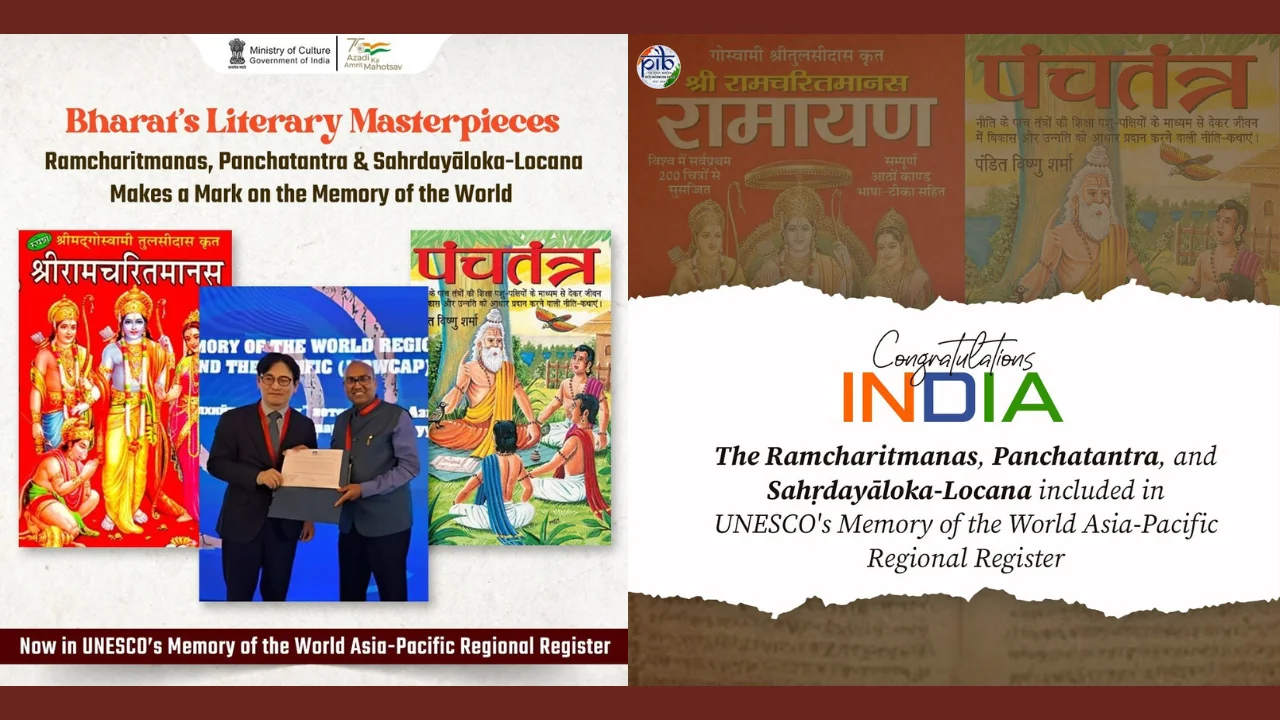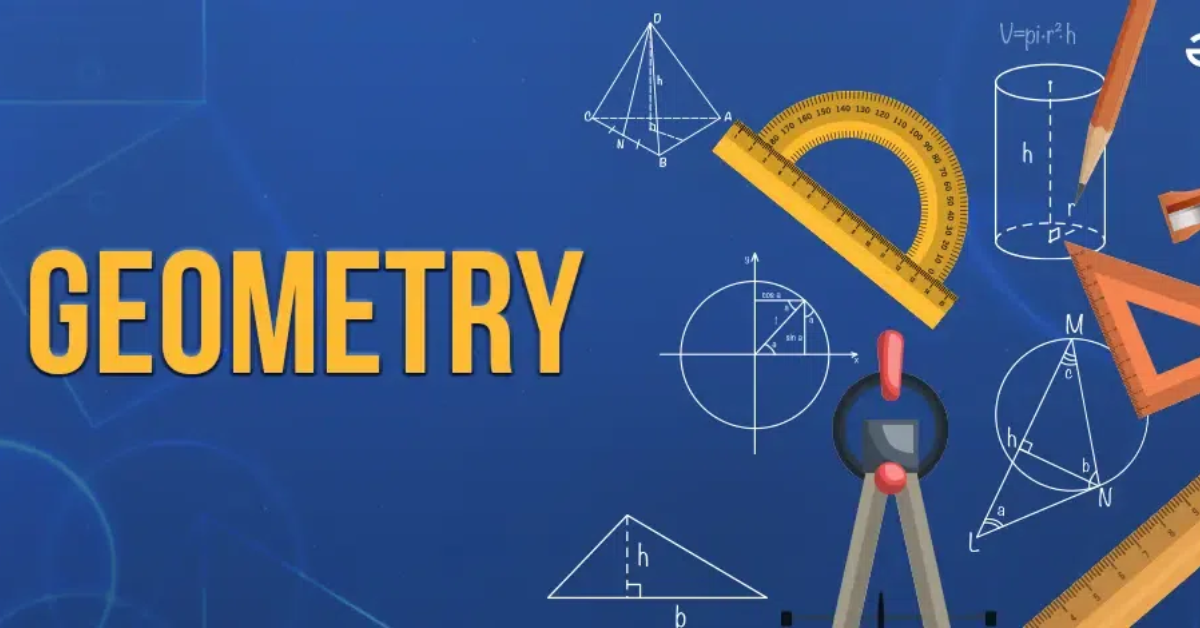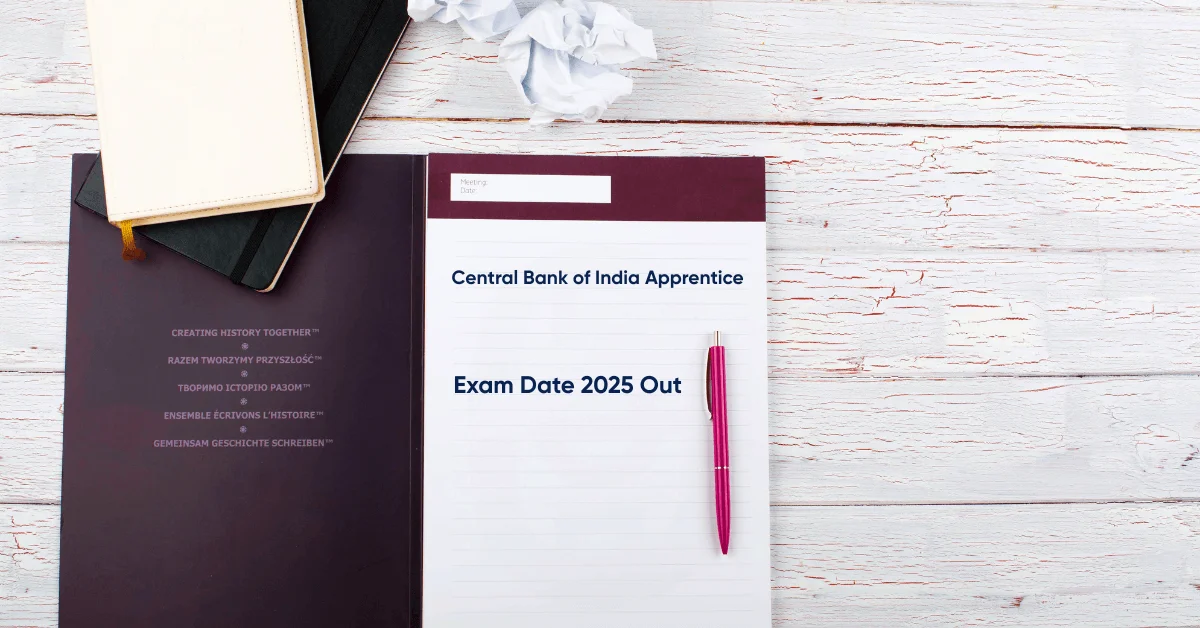Ramcharitmanas, Panchatantra, and Sahṛdayāloka-Locana enter UNESCO’s Memory of the World Asia-Pacific Regional Register
The inclusion of the Ramcharitmanas, Panchatantra, and Sahṛdayāloka-Locana in UNESCO’s Memory of the World Asia-Pacific Regional Register marks a significant achievement for India, showcasing the country’s rich literary heritage and cultural legacy. This recognition underscores the importance of preserving and celebrating diverse narratives and artistic expressions that contribute to our shared humanity.
Profound influence on Indian literature and culture
These literary masterpieces, including the Ramcharitmanas, Panchatantra, and Sahṛdayāloka-Locana, have profoundly influenced Indian literature and culture, shaping moral values and artistic expressions across generations. Authored by Acharya Anandvardhan, Pt. Vishnu Sharma, and Goswami Tulsidas respectively, these works have transcended time and space, leaving a lasting impact on readers and artists worldwide.
Paying homage to the creative brilliance of creators
By honoring these timeless classics, society pays homage to the creative brilliance of their creators while ensuring that their wisdom and teachings continue to inspire and enlighten future generations. This recognition also reflects India’s commitment to preserving and promoting its cultural heritage on the global stage.
IGNCA’s Pivotal Role in Securing Global Recognition
During the 10th meeting of the Memory of the World Committee for Asia and the Pacific (MOWCAP), held in Ulaanbaatar, the Indira Gandhi National Centre for the Arts (IGNCA) played a pivotal role in securing a historic moment. With 38 representatives from member states and 40 observers and nominees in attendance, IGNCA advocated for three Indian nominations, leading to their inclusion in UNESCO’s Memory of the World Asia-Pacific Regional Register.
The Kala Nidhi Division at IGNCA successfully presented the nominations for three iconic Indian works: The Ramcharitmanas, Panchatantra, and Sahṛdayāloka-Locana. This achievement underscores IGNCA’s commitment to preserving and promoting India’s rich cultural heritage, while also advancing the nation’s literary legacy on the global stage. Notably, this marks the first time IGNCA has submitted nominations to the Regional Register since its establishment in 2008.
Significance of the Works
The Ministry of Culture emphasized the significance of preserving and celebrating diverse narratives and artistic expressions that unite humanity, following the inclusion of three works in UNESCO‘s Memory of the World Asia-Pacific Regional Register.
- These literary masterpieces, including the Ramcharitmanas, Panchatantra, and Sahṛdayāloka-Locana, have left an enduring impact on readers and artists worldwide.
- These texts were chosen for their timeless appeal.
- For instance, the Ramayana and Ramcharitmanas are widely read not only in India but also in Southeast Asian countries like Cambodia, Thailand, Sri Lanka, and Indonesia.
- The submission of two Ramcharitmanas manuscripts—one by Goswami Tulsidas and the other in Arabic from the 18th century—highlighted the global appeal of the text.
- Similarly, the Panchatantra fables were selected for their universal moral values, while the Sahṛdayāloka-Locana, authored by Kashmiri scholars Acharya Anandvardhan and Abhinavagupta in the 15th century, was chosen for its aesthetic qualities.
This marks the first time since the formation of MOWCAP in 2004 that India has submitted nominations, and all three nominations were accepted, underscoring India’s rich cultural heritage and literary contributions to the world.
UNESCO’s Memory of the World (MOW) Register
UNESCO’s Memory of the World (MOW) program serves as an international collaboration strategy aimed at safeguarding, protecting, and ensuring access to documentary heritage, particularly heritage that is rare and at risk of being lost. Launched in 1992 to prevent “collective amnesia,” the initiative focuses on preserving invaluable archive holdings and library collections worldwide, promoting their widespread dissemination.
The program identifies and recognizes the documentary heritage of international, regional, and national importance, maintaining registers and awarding a logo to identified collections. It advocates for preservation and access without discrimination, raising awareness among governments, the public, businesses, and commerce about preservation needs and fundraising efforts.
Inclusion in the MOW register confirms the significance of documentary heritage, increases its visibility, and enhances access to it, thereby facilitating research, education, entertainment, and preservation efforts over time.
Other Items on the List
As of May 2023, the International Memory of the World (MoW) Register boasts 494 inscriptions, according to the UNESCO website. However, the MoW program also operates on regional levels, with the Memory of the World Asia-Pacific Committee (MOWCAP) honoring achievements in genealogy, literature, and science across the Asia-Pacific region.
During the 2024 cycle, at the tenth General Meeting in Ulaanbaatar, MOWCAP added 20 items to its register, including three from India.
- Among these were contributions from China, Indonesia, Malaysia, Mongolia, the Philippines, and Uzbekistan.
- Noteworthy inclusions encompassed documents highlighting business and industrial innovations, such as tea-drinking entrepreneurship in China and research on sugar and cement production in Indonesia.
- Additionally, the MOWCAP celebrated regional literary traditions, including the Philippines’ Indigenous Hinilawod chants and the East Asian legend of the Nine Tripods depicted on bronze bas-reliefs in Vietnam.
- The 2024 cycle also recognized achievements in science and literature, featuring Bangladesh’s sci-fi feminist author, Rokeya S Hossain, for her 1905 utopian narrative, “Sultana’s Dream,” which imagined helicopters and solar panels before their invention.
- Furthermore, Australia and Tuvalu were acknowledged for their joint documentation on scientific expeditions exploring coral reef formation.
Since its establishment in 1998, the MOWCAP Regional Register has inscribed a total of 65 items from countries across the Asia-Pacific region.
- How to Prepare for SSC CGL with Full Time Job? Get Complete Guide
- 40 Geometry Formulas PDF – Download Here
- RRB ALP Mock Test 2025 Official Link , Know How to Solve
- Sarkari Result 2025, Latest सरकारी नौकरी Updates & Results
- RRB ALP Vs RRB JE, Which is Better Job?
- Central Bank of India Apprentice Exam Date 2025 Out

Hello, I’m Aditi, the creative mind behind the words at Oliveboard. As a content writer specializing in state-level exams, my mission is to unravel the complexities of exam information, ensuring aspiring candidates find clarity and confidence. Having walked the path of an aspirant myself, I bring a unique perspective to my work, crafting accessible content on Exam Notifications, Admit Cards, and Results.
At Oliveboard, I play a crucial role in empowering candidates throughout their exam journey. My dedication lies in making the seemingly daunting process not only understandable but also rewarding. Join me as I break down barriers in exam preparation, providing timely insights and valuable resources. Let’s navigate the path to success together, one well-informed step at a time.






